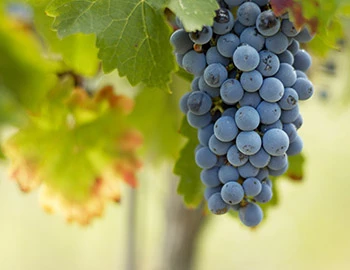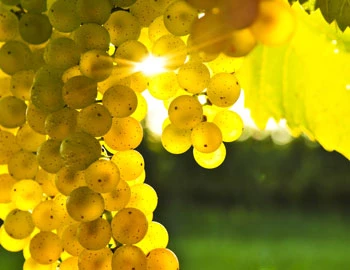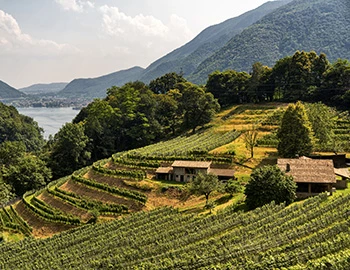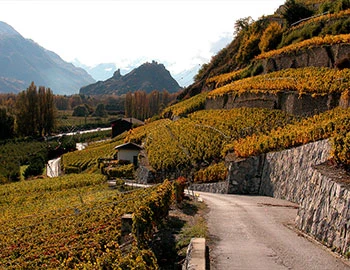Castello di Morcote Bianco 2022
DOC Ticino, Castello di Morcote, 750 ml

| Grape variety: | Merlot, Chardonnay |
| Producer: | Tenuta Castello di Morcote |
| Origin: | Switzerland / Tessin / Sottoceneri |
| Other vintages: |
Description
After some aeration, this white Merlot aged in wood with a small amount of Chardonnay shows a wonderful aroma spectrum with notes of lime and apple blossom, ripe citrus fruit and mirabelle plum and fine honey caramel. It spoils the palate with a full-bodied melt and mild acidity, paired with ripe fruit aromas and a touch of nougat. Serve it with dishes such as a Caesar salad with chicken or a veal paillard with cream sauce.
Attributes
| Origin: | Switzerland / Tessin / Sottoceneri |
| Grape variety: | Merlot, Chardonnay |
| Label: | Vegan, Certified organic or biodynamic wine |
| Ripening potential: | 4 to 10 years |
| Drinking temperature: | 16 to 18 °C |
| Food Pairing: | Risotto with ceps, Rabbit ragout with olives, Spaghetti carbonara, Saltimbocca, Scaloppine di vitello al limone, Mussels au gratin |
| Vinification: | fermentation in wooden barrel, soft pressing |
| Maturation: | in partly new and used barriques/ Pièces, bâtonnage |
| Maturation duration: | 12 months |
| Volume: | 14.0 % |
| Note: | Contains sulphites |
Tenuta Castello di Morcote
The vineyard of the Tenuta Castello di Morcote is widely held to be one of the most beautiful in Ticino. It lies some 200 metres above the picturesque village of Vico Morcote and offers a stunning view of the mountains and the Lago di Lugano. At the heart of this vineyard are the ruins of the Castello di Morcote.
It was in 1994 that the first vintage of the outstanding "Castello di Morcote" from Ticino came onto the market; with its 90% proportion of Merlot, it has since become a fixture of the Swiss wine scene. No less popular is the "Castello di Morcote Bianco", 90% of which is vinified from red Merlot grapes and 10% of Chardonnay.

Merlot
Everybody’s darling
Merlot is the most charming member of the Bordeaux family. It shines with rich colour, fragrant fullness, velvety tannins and sweet, plummy fruit. It even makes itself easy for the vintner, as it matures without issue in cool years as well. This is in contrast to the stricter Cabernet Sauvignon, which it complements as a blending partner. Its good qualities have made the Merlot famous worldwide. At over 100,000 hectares, it is the most-planted grape in France. It also covers large areas in California, Italy, Australia and recently in Eastern Europe. The only catch is that pure Merlot varieties rarely turn out well. Its charm is often associated with a lack of substance. Only the best specimens improve with maturity. They then develop complex notes of leather and truffles. This succeeds in the top wines from the Bordeaux appellation of Pomerol and those from Ticino, among others.

Chardonnay
King or beggar?
Hardly any variety of vine shows such a broad spectrum of quality as the Chardonnay. Its wines range from faceless neutrality to breath-taking class. It is an extremely low-maintenance vine, which explains why it is grown around the world – even in places where it probably should not be. The aromas of the Chardonnay variety are not very pronounced: a bit of green apple, a little hazelnut; in warmer latitudes, also melon and exotic fruits. The wines are often defined by maturing in casks. They develop more or less subtle notes of butter, toasted bread and vanilla. The grapes achieve their highest expression in their region of origin, Burgundy. Its heart beats in the Côte de Beaune: one might think of the plant growth of Meursault or Puligny-Montrachet. With their finesse and complexity, they can survive for decades. Chardonnay also achieves first class in some Blanc-de-Blancs champagnes. It additionally yields great wines in the Burgundian Chablis, and increasingly in Australia and Chile. A simple rule of thumb for pairing with food: When butter and cream are involved, you cannot go wrong with Chardonnay.

Tessin
Ticino: the Merlot Mecca of Switzerland
Ticino winegrowing is thought to date from Roman times, as early as 2000 years ago. But the foundation for today’s viticulture was laid just over 100 years ago, in 1907. It was then that the first Merlot vines were planted at Castelrotto in Malcantone. Since then, the variety has emerged triumphant here. Top selections matured in barriques more than measure up to those from Bordeaux’s Saint-Émilion or Pomerol regions.

Switzerland
Switzerland – A small country with enormous diversity
Switzerland is famous for its banks, watches, and cheese, but not necessarily for its wine. The Swiss didn't invent wine, but they have been extremely open and curious to it. Wine culture arrived in what is now modern Switzerland via several routes: from Marseilles to Lake Geneva and the Lower Valais region; from the Aosta Valley through the Great St. Bernard Pass to the rest of Valais; from the Rhone through Burgundy, across the Jura Mountains to Lake Constance; and from Lombardy to Ticino, and then on to Grisons.



